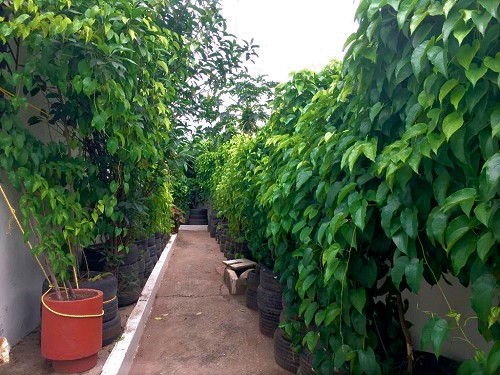
Growing food in lorry tyres: It’s green and sustainable
The breeze is soft, swinging the long dry vines hanging loosely on sticks.
Beneath the crackling sound was a long collection of vehicle tyres filled with soil and the vines that appear to have seen better days.
Advertisement
With permission from Dr Paul Fynn, the Chancellor of the Winscosin International University College, a young man lifts up one of the tyres.
He digs up the earth, delicately removing a thick yam from the soil. He does same for three other set of lorry tyres removing varying shapes and sizes of yams from them.
“Wooow! Grandpa, the yams are big,” Rev. Dr Fynn’s grand daughter, exclaimed as she watches in awe, while the young man dug into the dirt to remove each yam.
This is not a farm, but the back yard garden of the octogenarian.
Beaming with smile, he remarks that the Ghanaian youth had no business saying there were no jobs.
“People value fresh food.
These unemployed young people could easily grow vegetables at homes and sell to their neighbours,” he said, brushing off dirt from one of the yams.
Although Rev. Dr Fynn’s house could best be described as concrete jungle, because it is heavily built up, it also has patches of green space with a blaze of colours that brings the house to life.
Other Trending Stories
Apart from the ornamental plants, beneath a carpet grass sits giant pots that house ornamental plants, as well as cocoyams that produce the household’s kontomire (taro leaves), pepper and some herbs.
Home gardening
Generally, home gardening refers to the cultivation of a small portion of land which may be around the household or within walking distance from the family home.
Home gardens can be described as a mixed cropping system that encompasses vegetables, fruits, plantation crops, spices, herbs, ornamental and medicinal plants, as well as livestock that can serve as a supplementary source of food and income.
“The food you grow yourself is the freshest food you can eat.
And because home gardens are filled with fruits and vegetables, it's also among the healthiest food you can eat,” Dr Fynn said.
Not surprisingly, several studies have shown that gardeners eat more fruits and vegetables than their peers.
Gardens, in addition to being a source of fresh, healthy produce, ease stress and even improves the mood.

Backyard gardens
While food prices continue to rise and fall, the fact remains that most people have shied away from backyard gardens.
One would have wished that the planting for food and jobs policy, modelled on the highly successful “Operation Feed Yourself (OFY)” programme of the 1970s, would drive urban and backyard gardening, but that has not been the case.
The policy has been biased towards farmers in rural communities, who could have been encouraged to focus more on producing enough for the export market.
Households don’t need much land to start a backyard garden.
With lorry tyres and abandoned plastic bowls, fresh vegetables could bloom in homes across the country.
Advertisement
Give it a thought, particularly when research after research points to the fact that farmers in our cities are using contaminated water to irrigate the produce.
A survey carried out between 2007 and 2008 by the Small Grants Programme of the UNDP/Global Environment Facility (GEF) revealed that vegetables consumed in Accra had more than a dozen chemicals above tolerable percentages and these have serious health consequences for consumers.
The gains
What are the benefits of backyard gardens?
They are numerous and healthy.
A recent study in the Netherlands suggests that gardening can fight stress even better than other relaxing leisure activities.
Advertisement
After completing a stressful task, two groups of people were instructed to either read indoors or garden for 30 minutes. Afterward, the group that gardened reported being in a better mood than the reading group, and they also had lower levels of the stress hormone cortisol.
Benefits to children - According to Ms Anne Palmer, the Director of Eating for the Future, a programme based at the Johns Hopkins School of Public Health Center for a Livable Future in the United States, studies of after-school gardening programmes suggest that children who garden are more likely to eat fruits and vegetables.
They are also a lot more adventurous about giving new foods a try.
Freshness - As anyone who has ever eaten a tomato right off the vine can attest to the taste.
Advertisement
Sustainability - Eating local is one of the best things we can all do for the planet and avoid transportation, energy cost and pollution.
Access to quality food - Some residents in the cities do not have access to high quality, affordable fresh fruits and vegetables and a community garden can make all the difference in the world to them.
With the Sustainable Development Goal (SDGs) one and two targeting the eradication of poverty and hunger, there can be no better way to achieve that to incentivise the urban poor not just to grow their own food, but also sell as well.
The next time you see a vehicle tyre or throwing one away, just think of the potential garden you are dumping.




